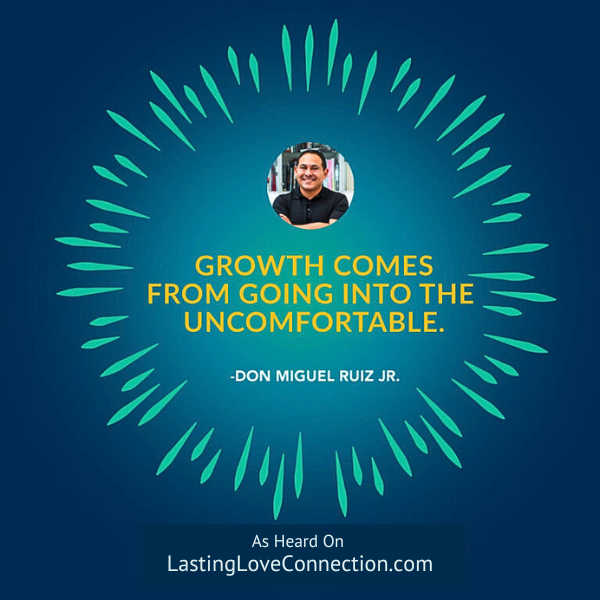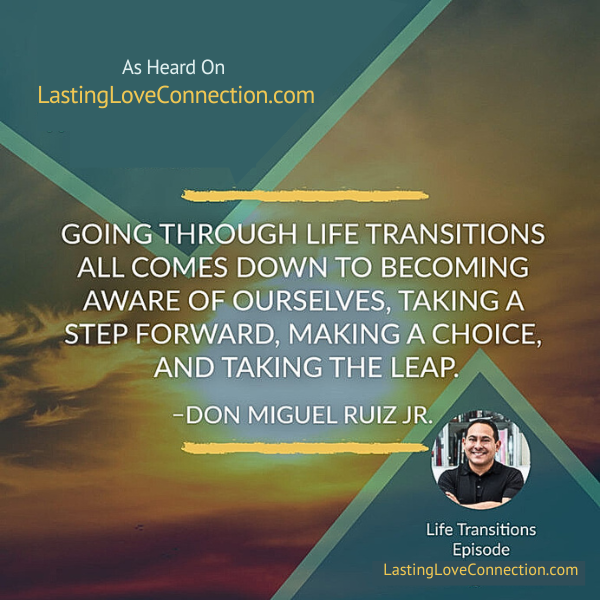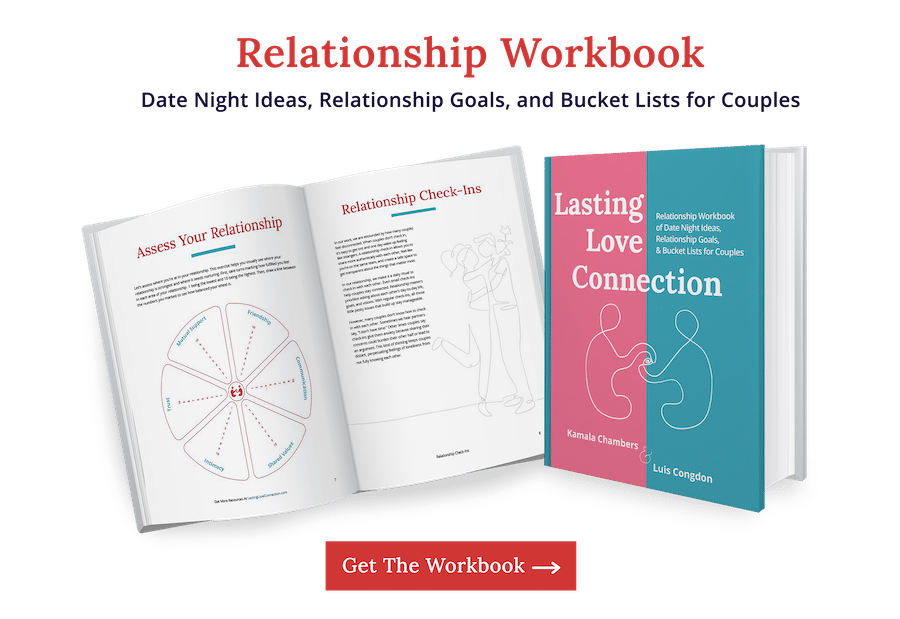Transitions happen at every moment in our lives, and it’s so important to master them. Some people have negative reactions to them because there are times when things are not going as they plan or how they think they should be.
Toltec wisdom teacher Don Miguel Ruiz Jr. talks about how respecting our emotions, having the confidence to make a choice, allowing yourself to change your mind, and perceiving the life moving around and within you could help you move through transitions gracefully.
Table of Contents
Key Takeaways
- These transitions are all about life.
- Moving is always a slow process, and many critical life transitions occur during that process.
- Transition and growth come from going into the uncomfortable, doing what is best for the family, and learning how to play again.
- Going through a transition all comes down to becoming aware of ourselves, taking a step forward, making a choice, and taking the leap.
- When we enter a new stage, we rely more on our ability to improvise and re-engage in a new environment. This means being aware of where our new setting is, what the environment is like, and who the people are.
- A negative emotional reaction kicks in when things are not going as you plan and how you think they should be.
- If we learn to detach, be part of the environment, and not expect a single thing, we will be better prepared for what’s ahead.
- As we transition into a new stage in life, you are the constant.
- It’s learning not to project or anticipate how it will be, even though it’s fun to come up with potential stories. We should not get attached to them so that we can actually see what’s in front of us.
- Instead of thinking of what should be, you see what is, and you get to play with that play; that’s the interesting part of life transitions.
- Personal journey or personal transformation could be easy if we were all robots void of any emotion, and then all the transitions could be emotionless life transitions
- We are beings who perceive life through this spectrum of emotions, ranging from complete joy to complete anger to complete misery.
- Our narrators are the voice of our thoughts or the voice of knowledge. Narrators are, basically, thoughts, beliefs, and ideas.
- Our narrators are there because we give them life.
- “Action speaks louder than words,” but we use words to describe every action.
- The whole point of the mastery of self is taking action and not allowing the emotions to take over us when you respect what those emotions are
- When we honor our emotions, we’re no longer blinded by our emotions.
- We can clear the narrator when we allow life to tell the story. Trust your own judgment and your own capacity to change your mind when it’s needed.
- The narrator could be the parasite that distorts everything you see and controls your actions, or it could be the ally that tells the story that reflects life.
- The whole point of the Toltec tradition is to regain confidence in yourself to make a choice, to express to yourself, “This is what I want. This is what I don’t want,” and actually listen to it.
- The voices that are going to be the loudest are basically the voices that we give attention to.
- Angel training is when we learn to be the messenger and pay attention to the voices.
- Whoever we give attention to will control how we respond, “Yes” or “No.”
- Using patience and will to achieve something and listening to the voice that’s going to nurture it.
- Negative thoughts are important aspects of life transitions. The best way to change a negative thought is to let it finish. There are gaps between thoughts, so you can catch it and shift your direction.
- Prolonging the space between thoughts is an exercise in strengthening our will and becoming aware of the voices, thoughts, and narrators in our minds.
- When prolonging the gap, you’re no longer projecting but perceiving and becoming aware of life moving around and within you. It’s called The Zone.
- In the Toltec tradition, the function of the mind is to dream, which means to perceive and to project.
- When you control that gap between thoughts, you suddenly control what the narrator says.
- To love someone unconditionally means being willing to see them for who they are rather than a projected mask. Love helps you navigate life transitions easily.
- The unconditional love in life transitions is the willingness to see life, to define the balance between having the confidence in yourself to make a choice and not projecting what that step is going to look like but being completely aware of what that step is
- There’s a difference between having the confidence to make a choice during the critical life transitions and changing your mind versus not having confidence in yourself and changing your mind not because you can see what’s in front of you but because you’re afraid to make a choice.
Transcription: Life Transitions – Don Miguel Ruiz Jr.

Kamala Chambers
Life transitions happen and are a continuous process. We break up with our partner; we lose a relationship, we move homes, we get sick, and we have to adapt to a new way of life. Someone dies.
Transitions happen, and today, we’re going to bring on Don Miguel Ruiz Jr. to talk about life transitions and how we can move through those transitions in a state of grace and ease and some really beautiful tips on how to make the transition easy.
Luis Congdon
Today’s guest is Don Miguel Ruiz Jr., whom I absolutely love. He has so much wisdom to share about life transitions. He was trained by his father, Don Miguel Ruiz Sr., who wrote the book The Four Agreements.
Don Miguel Ruiz Jr. has his own spin and a fantastic way of bringing Toltec Wisdom to life. So, in today’s interview, I’m honored and grateful that Don Miguel Ruiz Jr. has come on the show to grace us with his presence and wisdom.
Kamala Chambers
It is so great to have you on the show. Are you ready, Miguel?
Don Miguel Ruiz Jr.
Yes. Thank you so much. How are you?
Kamala Chambers
We’re doing so lovely because we’re sitting here with you. Right, Luis?
Luis Congdon
That’s right. We’re going to be talking about life transitions, shifts, and going through this process.
Right now, you’re in the process of moving, but in life, all of us are dealing with some sort of life transition at some point or another, either the loss of somebody, the birth of a child, moving homes, or changing. How is it for you to go through these life transitions, and how does the Toltec wisdom help you move through this space?
Mastering Life Transitions
Don Miguel Ruiz Jr.
These transitions are all about life. Sometimes, life transitions make you unhappy. I remember the time when I was a child when my father took me to the park one day, and after playing for some time, my dad found me crying on the edge of it. He asked me why I was crying, and I said, “I was too big for the swings.”
I’m too big to play, and I was so sad because it’s something I enjoyed doing, something I loved to do, and I was so carefree about it and then, it came the day when I went to the swings, I went to the park, and I was too big. I couldn’t fit. It was uncomfortable, and I lost something, and it was heartbreaking.
Right now, we’re transitioning, and we are going through so many unique life transitions. We’re making the slow process. Moving is always slow, and it’s a process. Moving from California to Nevada, I’m watching not just my wife’s and my transition but I’m watching my kids, and it’s the same concept.
We lived in a home we loved and enjoyed, but we got to the point where it no longer fit. The lifestyle and the functionality don’t fit, and it’s time for a transition and adaptation to a new reality. So, some life transitions are intentional, which makes us happy.

Some types of transitions in life are when someone passes away or when someone is born. And it’s so true because my younger brother is having a new baby next month, so we’re going to have a new Ruiz member. That’s one of the reasons why we’re moving, and it all comes down to attachment—the attachment of a dream that we thoroughly enjoyed, thrived in and made lifetime bonds with.
We have neighbors and friends with whom we’re going to be friends for the rest of our lives. We know that. Yet, there’s a moment where it doesn’t fit anymore, and we’re going to transition to a new place, and we’re going into the unknown.
Certain patterns we know will repeat themselves in the unknown, but still, the unknown and a huge emotional part of us wants to hold on to something that makes us happy and comfortable.
Related Podcast: Emotional Self-Awareness – Dr Travis Bradberry
Don Miguel Ruiz Jr.
We need to re-learn; if something happens when we’re transitioning, we think we can’t do this again. For instance, someone who goes through a breakup had first thought, “I’m never going to love again. How am I going to fall in love again? I will never have a relationship like that.”
And then, you find out the next relationship is even bigger and better than the last one because you found a relationship that fits who you are as an individual.

Don Miguel Ruiz Jr.
Some would say, “Take the risk,” but it’s really not a risk. It’s just simply, “Take the step to the new stage in life,” whether it’s the death of someone we love, the birth of someone we’re going to love, or just simply letting go of a dream where you saw your kids grow up the next last 6 years.
They’re going through a dream where they’re not going to be the kids. They’re going to be teenagers, and their teenage years will be life transitions.
A person going through life transitions is like the serpent that sheds its skin. Because he loves the skin so much, he carries with him all the skins he’s left behind wherever he goes, and it’s just a huge mess. But in order to survive, he lets go of it all and engages in the new environment.
Kamala Chambers
Something I really love about what you said is learning how to play again. When we move into a new space or go through different life transitions, it’s almost like we have to find who we are again in that new space, situation, relationship, and home. I love that you brought play into it.
Do you have any practices, exercises, or tips on how to bring more of that delight into the new experience?
Don Miguel Ruiz Jr
I remember a joke that Woody Allen said. It is, “If you want to make God laugh, tell him your plans.” Funny enough, my grandma used to say the same thing.
Today was my daughter’s first day of school. It is one of the important life transitions in a child’s life. She’s going to school even though we’re transitioning. Here she was, planning how her day was going to be, planning her clothes and what she was going to say.
She has all these things prepared, and then she shows up, and everything she thought of wasn’t really going to apply because the environment changed everything enough that her whole routine just changed, and she has to improvise.
Self-efficacy in Life Transitions

Don Miguel Ruiz Jr.
In reality, when we enter a new stage, we’re relying more on our ability to improvise and re-engage in a new environment, which is to be aware of where our new setting is, what the environment is like, and who the people are.
The willingness to see again instead of projecting onto life what you want to see and expecting that’s what you’re going to see. That’s where everything falls apart during some life transitions.
Negative emotional reaction kicks in because it’s not going as you plan, as you think it should be, and people are not behaving the way you think they are. You’re already going into a scenario with a preset of ideas and beliefs that, to some degree, we’re attached to.
But if we learn to detach, be willing to be in the environment, and not expect a single thing, we will be better prepared for what’s ahead because the constant is oneself. So, the one thing that you can expect to see is you.
You are the constant in every room you’re in and in every cycle you’re in. Even as we transition into new stages in life, you are the constant.
So, if there’s a practice to apply to life transitions, it’s learning not to project or anticipate how it will be. Even though it’s fun to come up with potential stories, we should not get attached to them so that we can actually see what’s in front of us. And it’s true, not just with a new environment but within ourselves.
Surviving Life Transitions

Don Miguel Ruiz Jr.
So, the practice means to take a breath. Allow yourself to take that breath and focus all your attention there, realizing that is the beginning point. When you open your eyes, you’re starting a new transition. You’re starting a new stage in life. What do you see? What do you hear? What are you engaging in? From there, inspiration comes in because instead of thinking of what should be, you see what is, and you get to play with that play.
Luis Congdon
This really reminds me a lot of your last book, where you talked about how you are watching a soccer game, and the narrators were telling you about the athlete, what he was up to, and what was going on in his life transitions. They’re giving you a play-by-play not just of the game, but they’re also informing you of who it is and shaping your opinions of what’s happening. Then, you talked about watching that game on mute.
Don Miguel Ruiz Jr.
Yeah, the narrators.
Luis Congdon
It’s a big process to stop that narrator. I don’t know about you, Kamala, but sometimes I really struggle to turn that narrator off. I have a lot of opinions about what’s happening and who someone is, and that narrator sometimes gets in the way without knowing the life transitions.
Kamala Chambers
Yeah, the stories that we tell ourselves, and I think it’s kind of where most humans are built to create stories about what each moment is bringing, what people are bringing, who people are, and even stories about ourselves. I think that could really get in the way of a time of life transitions, and I love the way you’ve reframed it for us here.
What else do you feel is a stumbling block for people going through life transitions?
Emotional Development and Life Transitions

Don Miguel Ruiz Jr.
I’m going to combine that question with the commentators or the narrators because there’s the emotional factor. Personal journey or personal transformation could be easy if we were all robots to avoid any emotion. If we allowed simply logic to reign in our bodies, then we wouldn’t need self-help. It’s easy to transition, but we are emotional beings.
We are beings who perceive life throughout this spectrum of emotions ranging from complete joy to complete anger to complete misery. And we go through all those stages. We get to that and experience that. The emotions are real during all life transitions.
What has been true to them may not be, and that’s where the combination of the narrators kicks in because our narrators are the voice of our thoughts. My father would have called it the “Voice of Knowledge. “ The narrators are basically thoughts, beliefs, and ideas that tell stories about unique life transitions.
The thing about a narrator, which is simply a word to describe that voice of thought, that tree of thought that happens in our mind, is the same energy I use to move my leg and to move my arm. It’s the same energy I use to create a thought, and at the root of every belief I have, there is a yes, giving it life.
There’s nothing in my belief system that I say “No” to. Thus, our narrators are there because we give them life as our life transitions.
Related Podcast: Interview With Dr Bruce Lipton Biology Of Belief
Taking Action During Emotional Life Transitions

Don Miguel Ruiz Jr.
So we’re telling the story. We love to tell stories. We love to put into words what we perceive, whatever happens during the life transitions.
Like the expression, “Action speaks louder than words,” we use words to describe every action. We describe actions with our words, and those words have an emotional charge.
We can paint a scary painting, a scary story, or the most illuminating, hilarious, wonderful experience. It can be shifted immediately. We can paint the moving to transition as this, and they will love again, or I will never experience happiness again.
I’m never going to make friends the way I had them here. When you paint that picture with that narrator, the unknown, which is the future, looks grim, dreary, and terrible.
If you see it from the point of view of joy or happiness, it’s going to be happy, and it’s going to be great. But when you respect that emotions are real and respect what our emotions are, you find that they have great benefits.
When that happens, you no longer allow the emotions to take action for you. We take action during emotional life transitions. That’s the whole point of mastery of self.
Learning to Honor Emotions

Don Miguel Ruiz Jr.
We become aware that I control my “Yes” and I control my “No.” I control the energy that controls and animates this body and this mind during life’s transitions from doubt to self-confidence.
But we must honor our emotions, which is, I think, the clouds are perception when we move or a transition that blinds us, and what feels is the narrator’s story.
When we honor our emotions, we’re no longer blinded by our emotions, which is one of the keys to handling life transitions. We get to see what’s in front of us, and that’s very important because in front of us are multibillion opportunities, an infinity of possibilities.
For example, in my case, the move to Reno could be disastrous, or it could be the most wonderful experience because we’re moving to be near my brother, his wife, and our new baby, Julius. We rebuild our dream around family.
The kids have a place to run around near Lake Taho. This completes the story and, of course, things that can go wrong, but that’s going to be true if we stay in Rockland or not.
Allowing Life To Tell The Story

Don Miguel Ruiz Jr.
It’s about who is telling the story. Am I allowed to tell the story? Am I allowing my emotions to tell the story as life transitions? Or am I allowing life to tell the story?
When we allow life to tell the story, we can clear the narrator because when life tells the story, you realize it’s a dance—a dance between the choices I make in life and the consequences that life gives back. It’s a beautiful balance that helps us find peace during life transitions.
For example, we just made three offers and changed our mind on the first two because we realized we liked the house, and that felt good.
Self-belief During Life Transitions
Don Miguel Ruiz Jr.
You must be able to trust your own judgment and your own capacity to change your mind when it’s needed. You must also realize that it will not reflect your reality. This is not because I’m being fickle or wishy-washy; it’s because I’m realizing that the consequence of that choice may not reflect the consequences I want to experience in life.
And then, allowing myself to change my mind, respect myself, and have a voice allows me to finally find that one place where I said, “You know what? I like it. I want it.” You know it’s the correct one when you make the choice, and it feels good, and there’s no doubt about it. That’s how you clear the narrator.
The narrator can either be the parasite during critical life transitions, which basically distorts everything I see, controls my actions and my judgment of myself, controls me through this image of like, “No, you have to fall through it because you got to do this, you got to do that,” or you have the narrator be the ally.
The ally is the one who tells the story that reflects life as opposed to a narrator who describes life as an illusion. To me, the whole point of the Toltec tradition is to regain confidence in yourself to make a choice, to express to yourself, “This is what I want. This is what I don’t want,” and actually listen to it.
Deciding Which Voice To Listen To

Luis Congdon
Not too long ago, I was talking to a client, and we were talking about some of the things happening in this person’s life and what was going on as his life transitions. As I listened, I could hear the narrator and how the narrator wasn’t really supporting this person and supporting their journey.
I started to play around with just the thoughts around what was happening with the client, and at some point during our conversation, the client said, “You know, I’m noticing I can actually decide which voice I want to listen to.”
They were astounded by this idea that the voice in your head was just a commentator and that you could comment right back and start having a conversation. They could have a choice, and that could totally shift their experience.
To me, that’s what you’re talking about, and it’s a very powerful place to be during important life transitions. I know that sometimes, I don’t always have the wits about me to be in that space and notice that.
I know that Don Miguel Ruiz Sr., your father, had a heart attack. He was in a coma and was out for a while. To me, that’s a transition to have this moment where you realize, “I could die at any time. I’m not invincible, and I might not always be around,” and there was a decision he made while he was out.
I’m curious: what’s that been like for you? Has he changed a lot? What’s the experience of watching him go through this transition?
Don Miguel Ruiz Jr.
Yeah, the man who came back from the coma was not the same man who went into it. Life puts these obstacles in front of you, and it’s when you realize you can walk and talk as fast as you can.
The doctors told him to spend the rest of his days on a sofa resting, and my dad said, “No. I’m going to live.” The man climbed the top of the Pyramid of the Sun with 15% heart capacity.
He came back from his coma. He was with a heart that was only 15% capable of functioning. His body was full of pain, and he was given a very delicate balance of medications. People would give him all this talk and give him homeopathic this, homeopathic that, medicine here, medicine that.
Anything they really would introduce would actually kill him because you never know how his body reacts. That’s the thing about medicine. There’s a fine balance.
Angel Training During Life Transitions

Don Miguel Ruiz Jr.
Learning how to live with that balance was very interesting to watch my father do, and yet not allowing pain to stop him from living was an even bigger thing. Like you were describing, watching your clients become aware that they can pay attention to the narrators and can choose.
That’s what we call “Angel Training.” It’s actually very advanced work for us because it is the moment you become aware that I am not the voice inside of my own mind, but I am. Sometimes, life transitions very interestingly.
For example, who’s listening if I’m the voice that’s talking to my mind? I am. I am listening. If I’m the one who’s listening, who’s talking? I am. I am not this body or this mind, but I am the energy that animates both. My mind is infinitely possible because I can dream and perceive in so many directions.
The voices that will be the loudest during our life transitions are the voices that we give attention to. What I mean by voices is “Thoughts.” They are the thoughts in our minds because we’re constantly interacting within ourselves. We’re the individual dream.
So what we call “Angel training” is learning to be the messenger and basically giving attention to the voices, also known as thoughts or beliefs, in our mind that we want to give attention to. Because whoever we give our attention to will control how we respond, “Yes” or “No.”
Controlling Your Will

Don Miguel Ruiz Jr.
I become aware that I control my will. And that’s something I wished with my father during his life transitions. When he decides to take a step to climb the Pyramid of the Sun, even with that much pain, he adapts.
He didn’t run it the way he used to. He figured out a way that allowed him to do it, which was to do it slowly, take a few steps, sit down, and have the patience. Also, it was an exercise in patience rather than strength because that’s what we’re used to.
If we’re so used to achieving something with this one instrument, we think we can’t do it in any other way except for this instrument. In this case, it’s force or strength that helps you out in handling life transitions.
Building up the strength of the heart and the strength of the body is necessary to go up the pyramid, but if you don’t have those tools—if you don’t have the heart and the muscle—then what do you have? What’s in front of you? Patience and will.
Controlling Your Mind During Life Transitions

Don Miguel Ruiz Jr.
So now, you have learned how to use that instrument, as well as patience and will. You’re going to listen to the voice that nurtures it.
From that point of view, the voice that’s going to speak the loudest is the one that will help you in your environment. That’s choosing which one to control, which voice, and which narrator is going to help us. That’s what we know as the ally. For that, I am aware of what I give my attention to, aka what I give my power to, which is the belief I give power to in surviving major life transitions.
My brother has an image that I love to use, and apparently, it’s not just my brother, but it’s everywhere. There’s a story of an old Native American talking to his young grandson about how you can manage your life transitions using your willpower.
The grandfather tells the son, “There are two wolves inside you. One is good, and the other is compassion. The other one is evil, and anger and lack of compassion, and they both exist within you.” The grandson said, “If I’d make them fight, which one would win?” And the grandfather will say, “The one you feed.”
Whichever one of these beliefs, knowledge, ideas, voices, or narrators, be it fear, anger, love, or compassion, is the strongest, and we should pay attention to it.
So, with that in mind, the change in my father after his heart attack, even after his heart transplant, was the faith in himself and who’s he going to give attention to, the voice of fear, the voice of doubt, or the voice of patience and the voice of resilience. Two of them will help him, two won’t. One will feed the fear, and the other will feed the ability to accomplish what he wants.
Silencing The Mind Through Life Transitions

Don Miguel Ruiz Jr.
From that point of view, we go back to the previous question: How do we silence the mind as our lives transition through various stages?
How do I remove those filters? The answer is to become aware that the filters don’t control you. You control the filters. You control what goes on in our minds.
For example, my dad gave me this technique: If you find a negative thought in your mind that is making you miserable in the way you know, that makes you miserable by the way you feel, the best way to change it is to let the thought finish. When the thought finishes, redirect your attention.
You see, there are gaps between thoughts. There’s a gap between the first thought and when you finish the thought, our thought begins. There is silence between the two thoughts. When you become aware of that gap, you slowly focus first your attention on how your thoughts end.
When you become aware of how to catch it, you shift your direction. You shift your attention to go in a different direction, be it the sound of your breath or the sound of music. You’re able to prolong the space between thoughts, which means you are able to prolong silence.
And it’s an exercise in the strengthening of the will to make the most of our life transitions. But it’s also this exercise of becoming aware of the voices in our own mind, the thoughts, or the narrators.
Projecting As Our Life Transitions

Don Miguel Ruiz Jr.
So, when we become aware of that gap. The game my father always wanted to play was to teach us how to prolong that gap because what happens in that gap is that you’re no longer projecting; you are perceiving.
That’s what I’ve come to learn. You begin to perceive what’s around you. That’s what the gap is. It’s the silence of life that’s allowing you to perceive it. Because when we have a thought, we’re projecting.
Once again, the function of the mind in the Toltec tradition is to dream, which means to perceive and project as our lives transition. Projection is the thoughts. Projections are the least that we have. As we say at the beginning of the show about transitions, we’re projecting into the unknown.
A possible story that we want to have, and we may be happy and maybe sad, but the moment we stop projecting is when we learn to perceive, listen, see, and be in the moment. It’s what they call “The zone”. It’s when you become aware of life moving not only around you but within you.
I’ve found my father more in that space, and growing up, being in that space was difficult because there were a lot of consequences to my father being there. There are a lot of consequences and decisions, and the insurance and bills and all kinds of things that had to be paid because to have a heart attack and being in a coma is a very expensive thing.
It costs a lot of money, and the wrong choice can have stronger ramifications. So, you have to be aware of what choices you make, how you do them, and why you do them.
My father usually calls this “Being in the eye of the hurricane.” You let the hurricane go around you, but you stay in the center. What I’ve become aware of is staying in the center and finding that gap in between thoughts, and even then, going back to how we perceive those voices and narrators that we listen to.
Controlling the Gap and Honoring the Emotions During Life Transitions

Don Miguel Ruiz Jr.
When you control that gap between thoughts, you all of a sudden control what the narrator is going to talk about, which eases life transitions.
It becomes a lot easier because it’s like giving someone permission to talk in your presence. All of a sudden, you realize it’s been you.
You’ve been giving that narrator permission to talk, to control, and to drive all that time. That’s where honoring the emotion comes in. Once again, we honor this is how we feel. We feel that sadness, we feel that anger, and we feel that thing.
For example, yesterday, I made an offer on the house and watched the emotional reaction of all four of us: my wife, myself, my daughter, and my son. As I paid attention to that, I realized I could have let the narrator in my head continuously say, “No, no, no. This is this house. This is the house,” and force myself to do something that may not be the right thing.
If I listened to it and changed my point of view and saw what this one did, then all of a sudden, one voice got happy. My daughter was happy, but my wife wasn’t happy either. Her narrators were going off. Then, we made a choice, and I resented the offer.
After talking, I’m realizing this one made my daughter happy, this one made my wife happy, this one made my son happy. Now, this one is going to make me happy if I change my perception of this one little thing that I didn’t like about it. Now that I changed it, I’m like, “Hey, wait a minute. That does work. All right, fine. I’m saying yes to it,” and also, all four of us are saying, “Yes”. That’s the gap you need to fill in carefully during the life transitions.
Kamala Chambers
What a beautiful experience for you all to arrive at the same place. I think that’s kind of a trick that I find is important for me as my life transitions. That practices like looking at choices and decisions and transitions from a holistic experience. There are always different aspects of ourselves inside, and for me, it’s about getting all of those pieces playing together. All of the different aspects are in alignment, so I’ll feel that ultimate joy, and you’re doing it with your entire family, which is such a big move and such a beautiful place to get to.
Unconditional Love and Seeing Life

Don Miguel Ruiz Jr.
Yeah, it reflects my love for them. To love someone unconditionally is to be willing to see them for who they are rather than a projected mask as our lives transition. If you pay attention to what we were talking about on the show, it’s all about the projected mask.
Sometimes, we’re so attached to that projection that we force life to fit that projection, but sometimes, life doesn’t fit that projection. When you make it fit, it’s like trying to put you up through a cylinder hole, which is not going to work.
Even though you may try it, you might draw all the force and actually break it because you’re trying to make it fit during life transitions. It’s not going to work. The way to do it is to be patient.
Now, unconditional love is the willingness to see life, to define the balance between having the confidence in yourself to make a choice, which is to take that step into the transition and be confident in yourself to not project what that step is going to look like but be completely aware of what that step is. Because being flexible is a way of making a decision, of changing your mind and going, “This is what I want.”
The difference between having the confidence to make a choice and changing your mind and not having confidence in yourself and changing your mind is not that you can see what’s in front of you but that you’re afraid to make a choice.
There’s a huge difference between the two. It looks dramatically different. One is not having confidence in your choice; thus, you’re allowing the elements around you to control your choices. In this case, family, a realtor, or a family friend make the choices for you.
But if you have confidence in yourself and you listen to the realtor, the friend, and the family, you’ll find the one step that satisfies all—the one that works because it satisfies yourself, too.
Luis Congdon
What I like about what you’re saying, too, is that there is space for all the voices to be heard and listened to. Then, we can bring it all back to where we started: listening to the emotions and voices in your head, making a decision, and bringing everybody into play.
Don, it’s been a real honor to have you on the show today. I really loved everything you said. Thank you so much, and blessings on your move, and I’m excited for you.
Don Miguel Ruiz Jr.
Thank you so much, Luis. I really appreciate the opportunity. Kamala, thank you for having me on your show.







0 Comments